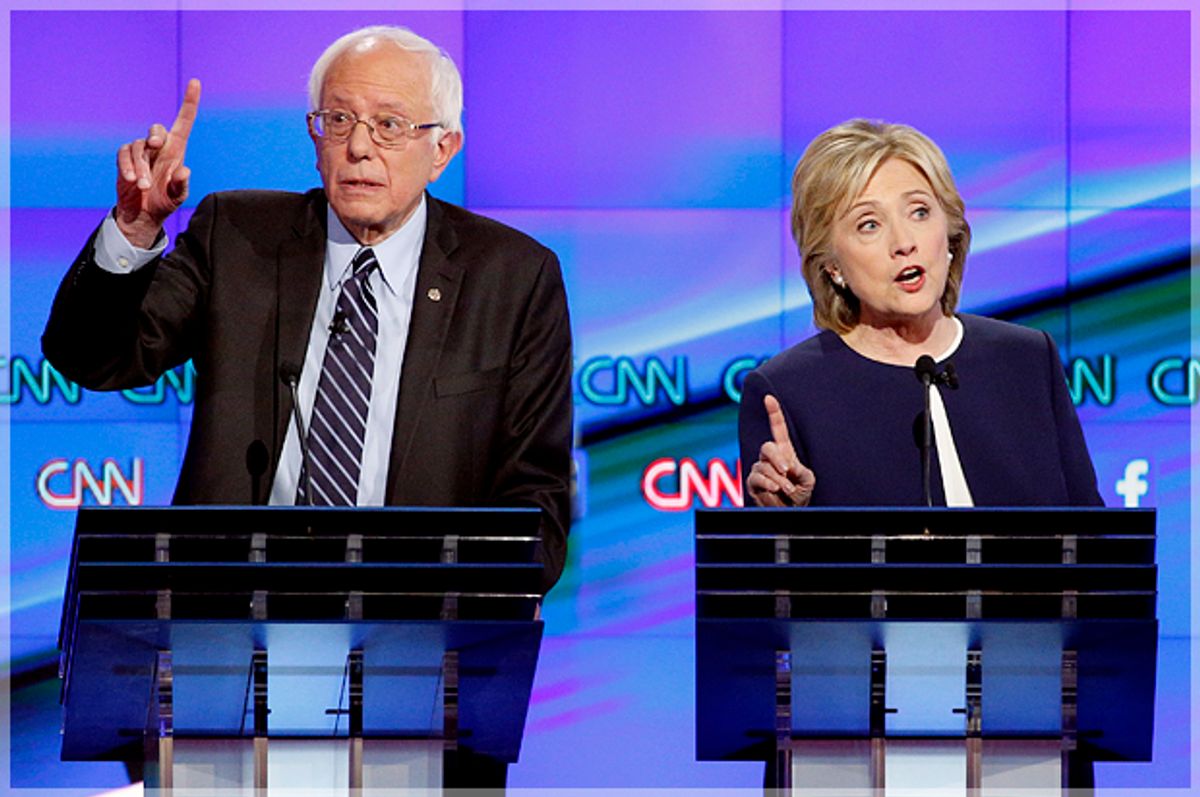I’m going to skip right past the question of whether Sen. Bernie Sanders or Hillary Rodham Clinton “won” Tuesday night’s debate, for two reasons: First, because no one can seem to agree what the criteria are for “winning.” Second, because it would only matter if the result were dramatic enough to change the overall dynamic of the campaign, which in this case rather obviously did not happen. Whether you’re feeling the Bern or ready for Hillary, you probably feel the same way now that you did before the debate.
So let’s table the horserace angle for now and take a closer look at one of the key exchanges of the debate instead. The back-and-forth was primarily between Clinton and Sanders, and it concerned their respective understandings of what the word “capitalism” really means. While I believe it would be a mistake to treat the moment as a Rosetta Stone for understanding the contest, I also think the New Republic’s Elizabeth Bruenig is right to say that the disagreement between Clinton and Sanders mirrors “a major fault line on the left.”
Before we start exploring that schism, though, here’s a recap for those who missed the debate. Responding to moderator Anderson Cooper’s question about whether he is a capitalist, Sanders said, “Do I consider myself part of the casino capitalist process, by which so few have so much and so many have so little; by which Wall Street's greed and recklessness wrecked this economy? No, I don’t." It was a strong, unapologetic, feisty answer; a great representation of why Sanders has become so adored by much of the American left.
It was also, however, an opportunity for Clinton to burnish her moderate bona fides. And she did. “When I think about capitalism,” Clinton said, “I think about all the small businesses that were started because we have the opportunity and the freedom in our country for people to do that, and [to] make a good living for themselves and their families.” She granted that “every so often” policymakers must “save capitalism from itself.” But she cautioned against “confusing” capitalism’s excesses with capitalism in general.
Sanders insisted he and Clinton were “in agreement” concerning “small and medium-size businesses.” But he added that “you can have all of the growth that you want,” but “if all of the new income and wealth is going to the top 1 percent,” it doesn’t matter. Cooper then let the debate move onto a new topic, which was unfortunate. Because in just a few words, Clinton and Sanders had each shared a very different worldview. Not only about the economy, but also politics. And voters deserve to have the choice before them made more explicit.
As Vox’s Ezra Klein notes, the disagreement between Clinton and Sanders has much to do with the role they envision for big business. Sanders’ politics are largely (but not exclusively) defined by “a deep and abiding skepticism of the role large corporations play in American life.” He “believes their most crucial innovations often simply free-ride on publicly funded research” and he “worries that their massive profits allow them to buy off politicians and rig the system.” Individuals within corporations may mean well, but corporations themselves are, to democracy, an inherent threat.
Clinton, on the other hand, is less inclined to generalize about big business. She’s fond of so-called public/private partnerships, served on the board of the über-corporation Walmart, and raised tens of millions of dollars from corporate CEOs and Wall Street executives. As her resistance to reinstating the Glass-Steagall Act has shown, she sees no problem with bigness, in itself. Quite the opposite, in fact, since large corporations tend to reap the largest profits — which, in theory, leads to better funding for the safety net.
If you keep this rough outline in mind and look again at their exchange during the debate, you should notice something off about Clinton’s argument. Despite having shown throughout her career that she has no problem with big business, Clinton’s defense of capitalism turns her disagreement with Sanders on its head. To her, she says, capitalism is about “small businesses,” not large corporations. But if that’s what she’s believed throughout her long career in politics, Clinton’s had an odd way of showing it.
Even more importantly, by replacing Wall Street with small business as capitalism’s true avatar, Clinton makes a class-based analysis of politics all but impossible. And this, really, is the essence of the Clinton/Sanders split. If capitalism has no inherent characteristics or motivations — if a mom-and-pop has just as much of a claim to True Capitalism as Goldman Sachs — then it follows that there is also no definite kind of capitalist. Which might explain why Clinton generally refrains from talking about a generalized “1 percent.”
In this sense, the answers Clinton and Sanders gave, respectively, to the debate’s final question (“Which enemy are you most proud of?”) may be just as revealing as their back-and-forth over capitalism. While both candidates mentioned the pharmaceutical industry, Sanders included Wall Street whereas Clinton said “the Republicans” instead. You may think the difference is incidental, but it isn’t. Sanders is campaigning against an entire class and economic system; Clinton is campaigning against conservatives.
And, to a significant degree, the contest between the two will hinge on which group — wealthy capitalists or conservative Republicans — Democratic voters see as the bigger threat.



Shares